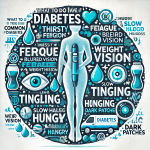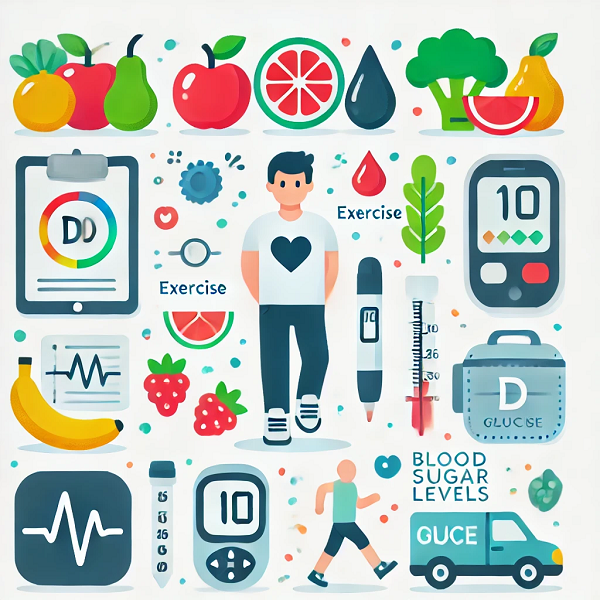The diabetes epidemic is a growing concern globally, affecting millions of people each year. With the World Health Organization (WHO) projecting that by 2045, nearly 700 million adults worldwide will be living with diabetes, it’s more crucial than ever to take proactive steps to protect yourself from this chronic condition. While genetic factors play a role in the development of diabetes, lifestyle choices, and preventive measures can significantly reduce your risk. In this article, we’ll explore the steps you can take to avoid becoming a victim of the diabetes epidemic.
Understanding the Diabetes Epidemic
Diabetes is a metabolic disorder characterized by high blood sugar levels over a prolonged period. The most common types are Type 1, Type 2, and gestational diabetes. Type 2 diabetes, which is often linked to obesity and a sedentary lifestyle, is by far the most prevalent, accounting for about 90-95% of all diabetes cases.
The rise in diabetes cases can be attributed to several factors, including poor diet, lack of physical activity, and increasing obesity rates. However, by understanding these factors and making informed choices, you can significantly reduce your risk of developing diabetes.

Adopt a Healthy Diet
Your diet is one of the most significant factors in preventing diabetes. A diet rich in whole foods, such as vegetables, fruits, whole grains, and lean proteins, can help maintain healthy blood sugar levels and prevent insulin resistance. Here are some dietary tips to consider:
- Prioritize Fiber: High-fiber foods like whole grains, legumes, fruits, and vegetables help regulate blood sugar levels by slowing down the absorption of sugar. Aim to include at least 25-30 grams of fiber in your daily diet.
- Choose Healthy Fats: Opt for unsaturated fats found in nuts, seeds, avocados, and olive oil instead of saturated and trans fats. Healthy fats improve insulin sensitivity and reduce inflammation.
- Limit Sugar and Refined Carbs: Excessive sugar and refined carbs can lead to weight gain and insulin resistance. Try to reduce your intake of sugary drinks, snacks, and processed foods.
- Portion Control: Overeating, even healthy foods, can contribute to weight gain and increase your diabetes risk. Practice portion control to maintain a healthy weight.
For more detailed dietary recommendations, you can check out the American Diabetes Association’s nutrition guidelines.

Engage in Regular Physical Activity
Regular physical activity is another key factor in diabetes prevention. Exercise helps control weight, lower blood sugar levels, and improve insulin sensitivity. Aim for at least 150 minutes of moderate-intensity aerobic exercise, such as brisk walking, swimming, or cycling, per week.
In addition to aerobic exercise, incorporate strength training into your routine. Building muscle mass helps your body use insulin more efficiently. Even small changes in your activity level, such as taking the stairs instead of the elevator or walking during your lunch break, can make a big difference.
If you’re new to exercise, the Centers for Disease Control and Prevention (CDC) provides resources on how to get started with physical activity safely.

Maintain a Healthy Weight
Maintaining a healthy weight is crucial for diabetes prevention. Excess body fat, especially around the abdomen, increases the risk of developing insulin resistance, leading to Type 2 diabetes. By adopting a balanced diet and regular exercise routine, you can achieve and maintain a healthy weight.
Even modest weight loss—about 5-7% of your total body weight—can significantly reduce your risk of developing diabetes. If you’re overweight or obese, consider consulting a healthcare professional to create a weight loss plan tailored to your needs.
For personalized weight management advice, visit the National Institute of Diabetes and Digestive and Kidney Diseases (NIDDK).
Monitor Your Health
Regular health check-ups are essential for early detection and prevention of diabetes. Routine screening for blood sugar levels, especially if you have risk factors such as obesity, a family history of diabetes, or a sedentary lifestyle, can help identify prediabetes or diabetes early on.
If you’re diagnosed with prediabetes, lifestyle changes can often reverse the condition and prevent the progression to Type 2 diabetes. Regular monitoring of your blood pressure, cholesterol levels, and body weight is also important in managing your overall health.

Manage Stress and Get Adequate Sleep
Chronic stress and lack of sleep can contribute to insulin resistance and increase your risk of developing diabetes. High-stress levels can lead to unhealthy eating habits, weight gain, and elevated blood sugar levels. Therefore, managing stress through relaxation techniques such as meditation, deep breathing, or yoga is essential.
Similarly, getting 7-9 hours of quality sleep each night is crucial for maintaining a healthy metabolism and hormone balance. Poor sleep can disrupt your body’s ability to regulate insulin and blood sugar, increasing your diabetes risk.
For tips on improving sleep quality, visit Harvard Health.
Limit Alcohol and Quit Smoking
Both alcohol consumption and smoking are linked to an increased risk of developing diabetes. Alcohol can cause spikes in blood sugar levels and lead to weight gain while smoking increases insulin resistance and inflammation in the body.
If you drink alcohol, do so in moderation—no more than one drink per day for women and two for men. If you smoke, seek support to quit, as quitting smoking can significantly reduce your diabetes risk.
For resources on quitting smoking, you can explore the American Lung Association.
The diabetes epidemic is a serious public health issue, but it’s not inevitable. By making informed lifestyle choices—such as adopting a healthy diet, engaging in regular physical activity, maintaining a healthy weight, managing stress, and monitoring your health—you can significantly reduce your risk of developing diabetes. Taking these steps now can help you avoid becoming a victim of the diabetes epidemic and lead a healthier, more fulfilling life.
#diabetesprevention #healthyliving #wellnessjourney #type2diabetes #bloodsugarcontrol #fitnessmotivation #nutritiontips #weightmanagement #healthyhabits #wellnesslifestyle







